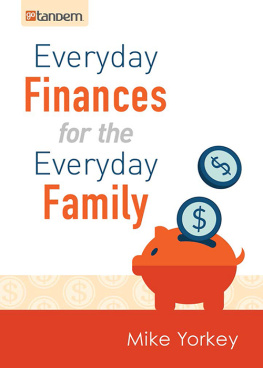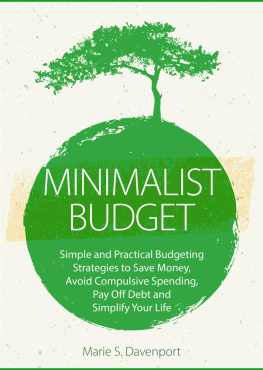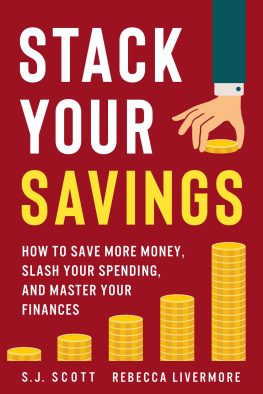
2015 by Back to the Bible.
Print ISBN 978-1-63058-368-2
eBook Editions:
Adobe Digital Edition (.epub) 978-1-63409-180-0
Kindle and MobiPocket Edition (.prc) 978-1-63409-181-7
All rights reserved. No part of this publication may be reproduced or transmitted for commercial purposes, except for brief quotations in printed reviews, without written permission of the publisher.
Churches and other noncommercial interests may reproduce portions of this book without the express written permission of Barbour Publishing, provided that the text does not exceed 500 words or 5 percent of the entire book, whichever is less, and that the text is not material quoted from another publisher. When reproducing text from this book, include the following credit line: From Everyday Finances for the Everyday Family, published by Barbour Publishing, Inc. Used by permission.
Scripture quotations marked NLT are taken from the Holy Bible, New Living Translation copyright 1996, 2004, 2007 by Tyndale House Foundation. Used by permission of Tyndale House Publishers, Inc. Carol Stream, Illinois 60188. All rights reserved.
Scripture quotations marked TLB are taken from The Living Bible 1971 by Tyndale House Foundation. Used by permission of Tyndale House Publishers, Inc. Wheaton, Illinois 60189. All rights reserved.
The authors are represented by and this book is published in association with the literary agency of WordServe Literary Group, Ltd., www.wordserveliterary.com.
Published by goTandem, an imprint of Barbour Publishing, Inc., P.O. Box 719, Uhrichsville, Ohio 44683, www.barbourbooks.com
Our mission is to publish and distribute inspirational products offering exceptional value and biblical encouragement to the masses.

Printed in the United States of America.
Dedication
To todays young families, trying to keep their heads above water
Introduction
When it comes to everyday, kitchen table finances, I have to be honest with you: this spending smart business can be tough.
I dont know about you, but it seems like whenever my wife, Nicole, and I have squirreled away a little moneyblam! We get blindsided by another big car repair bill. Or the water heater breaks. Or the property tax is due.
But thats all right. Nicole and I know God is in controlalthough I worry way too much. Perhaps thats because I know too much. Ive been keeping track of the Yorkey family expenses for the last fifteen years using Quicken software, and on average we spend 97.2 percent of everything that comes in. Some years we have spent more than 100 percentlike when we had two children in collegeand had to take on debt. But even in those years when we managed to spend less than we brought in, our margin of error was razor thin.
Life continues to be a financial scramble in our household, as I imagine it is in yours. Its my belief that todays American familiesovertaxed and squeezed by stagnant payare barely keeping their noses above water. Many of us are living paycheck to paycheck and bracing ourselves for the next calamitylike a leaky roof or major car repair. And who knows how were going to pay for the next car, college bills, and looming retirement.
The pressure to live within our means places tremendous stresses on everyone, but if you can spend smart on basic household expenses such as food, clothing, housing, transportation, vacations, and incidentals, you can realize a net savings of $300 to $1,000 a month. This is often the difference between a family staying financially solvent or sinking further into debt.
What expertise do I bring to the table? Well, Im just a regular working guya freelance author, which means my income takes wild fluctuations year by year. I cut my teeth on spending smart when I was editor of Focus on the Family magazine during the 1990s. A good chunk of my workday was spent reading about and writing for families, and personal finances were as big back then as they are now. I was vitally interested in spending smart because I was earning a modest salary working for a nonprofit ministry. In addition, my wife was a homemaker, so we were living off one income.
Our familys toughest moments came when I left Focus on the Family magazine and uprooted my family from Colorado Springs to my hometown of San Diego. My parents still lived there, and I missed the mild Mediterranean climate of my youth. Within four months at my new job, however, the paychecks stopped. I didnt know what to do.
We were in the middle of purchasing a new home. Mortgage lenders prefer making home loans to people who are gainfully employed. Since there was the promise of well get you caught up at my work, I continued to show up at my new job, figuring that if I helped turn around the company, then I had a better chance to receive back pay.
Meanwhile I closed escrow and took out a first trust deed for $15,000 more to tide us through the tough times. I worked four and a half months without a paycheck before finally deciding that I could no longer contribute to a fantasy world where the employees worked for free. I found a cubbyhole at home and started my freelance writing career.
Looking back, the only way we made it was by the grace of God and His people, who financially blessed us in miraculous and incredible ways. We also had a dogged determination not to take on any debt besides our home mortgage. That meant keeping an aging Mercury Villager minivan and driving a well-used Toyota Tercel that I paid $2,500 for. We also made sure we paid off our credit card statements in full each month, which was a miracle in itself.
Weve since righted the financial ship in our family, but looking toward the horizon, Id say that times are tougher today for American families. For sure, there are black clouds looming offshorethreatening clouds that first appeared during the start of the Great Recession in 2008. My sense is that gale-force winds are drawing closer to shore.
The evidence is swirling around us. The shrinking middle class is being squeezed every day. With food prices mounting, high gas prices here to stay, and heating and electrical bills poised to skyrocket due to government regulation from perceived climate change, American families feel like theyre caught outside in an unexpected snowstormwithout warm jackets.
As part of compiling this book, I surveyed 125 Christian families on their finances about spending smart. Sixty-seven percent said they were struggling to keep their noses above the water line, adding that the pressure to live within their means placed a tremendous stress on their marriages, causing dissention and even leading to divorce in some instances. Many couples said they were looking for new ways to save on basic household expenses such as food, clothing, and transportation.
If that tall order wasnt enough, these Christian families also told me that they were committed to supporting their local church, which often meant giving a significant chunk of income10 percent in many households. These same families also supported missionaries to foreign lands, adopted a child through various Christian agencies, or gave generously to parachurch organizations like Focus on the Family.
The couples I surveyed were generous: 85 percent said they gave at least 9 percent of their income to their local churches and charitable organizations. Compare this to the national average of 2.5 percent, according to the Christian research organization Empty Tomb. With all this sacrificial giving, many who follow Christ live even closer to the edge of financial difficulties than the typical family.






















